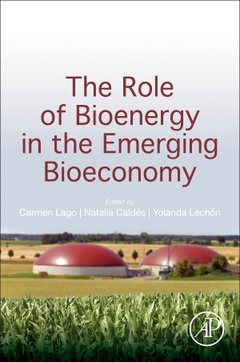Description
The Role of Bioenergy in the Emerging Bioeconomy
Resources, Technologies, Sustainability and Policy
Coordinators: Lago Carmen, Caldés Natalia, Lechón Yolanda
Language: English
Subject for The Role of Bioenergy in the Emerging Bioeconomy:
Keywords
Advanced biofuels; Biochemical conversion of biomass; Bioeconomy; Bioenergy; Biofuel; Biomass; Biorefinery; Biorefinery Complexity Index; Classification; Diesel substitutes; Drop-in biofuels; Energy; Heat and power; Integration; Land; Nexus; Petrol substitutes; Renewable fuels; Thermochemical conversion of biomass; Water
584 p. · 15x22.8 cm · Paperback
Description
/li>Contents
/li>Readership
/li>Biography
/li>Comment
/li>
The Role of Bioenergy in the Bioeconomy: Resources, Technologies, Sustainability and Policy provides the reader with a complete understanding on how bioenergy technologies fit into the new bioeconomy paradigm. Sections focus on the main resources and technologies for bioenergy and its integration in energy systems and biorefining chains, analyze the available methodologies for assessing the sustainability of bioenergy, and address and the propose approaches that are demonstrated through concrete case studies. Additionally, the implications of bioenergy in the water-energy and land nexus is presented, along with new challenges and opportunities.
This book?s strong focus on sustainability of bioenergy, both as a standalone, and in the larger context of a bio-based economy, makes it a useful resource for researchers, professionals and students in the bioenergy field who need tactics to assess the lifecycle and sustainability of bioenergy technologies and their integration into existing systems.
PART I. INTRODUCTION, RESOURCES, TECHNOLOGY AND POLICY 1. Nexus bioenergy – bioeconomy 2. Resources 3. Biofuels and biomass for heat and power 4. Biorefineries
PART II. SUSTAINABILITY 5. Sustainability of bioenergy 6. Key challenges and opportunities 7. Nexus water-energy-land
PART III. FUTURE TRENDS 8. Innovation 9. Future role of bioenergy
Engineering researchers, professionals and students in the bioenergy field, as well as environmental and agricultural scientists. Energy analysts and policy makers.
Natalia Caldés graduated in Economics and Business Administration from the Universidad Pompeu Fabra of Barcelona. She has an MsC in Applied Economics from the University of Wisconsin-Madison and a PhD in Agricultural and Natural Resources Economics from the Universidad Politécnica de Madrid, Spain. Dr. Caldés has been working in CIEMAT since 2004, her research focuses on energy policy as well as socio-economic and environmental impact assessment of energy projects. She has participated in several European Commission and National research projects focusing on renewable energy cooperation policies as well as externalities of power generation technologies. From 2012 to 2015, she coordinated the EU funded project BETTER which aims at assessing the opportunities and barriers associated to renewable energy cooperation between Europe and neighboring countries.
Yoland Lechón has a PhD in agricultural engineering from the Polytechni
- Presents a complete overview of the main challenges that bioenergy will have to overcome in order to play a key role in future energy systems
- Explores sustainability aspects in detail, both qualitatively and by applying proposed methodologies to concrete bioenergy case studies
- Covers, in detail, the water-energy-land nexus implications and governance aspects
These books may interest you

Sustainable Bioenergy Production 220.72 €

Bioenergy Resources and Technologies 177.10 €


